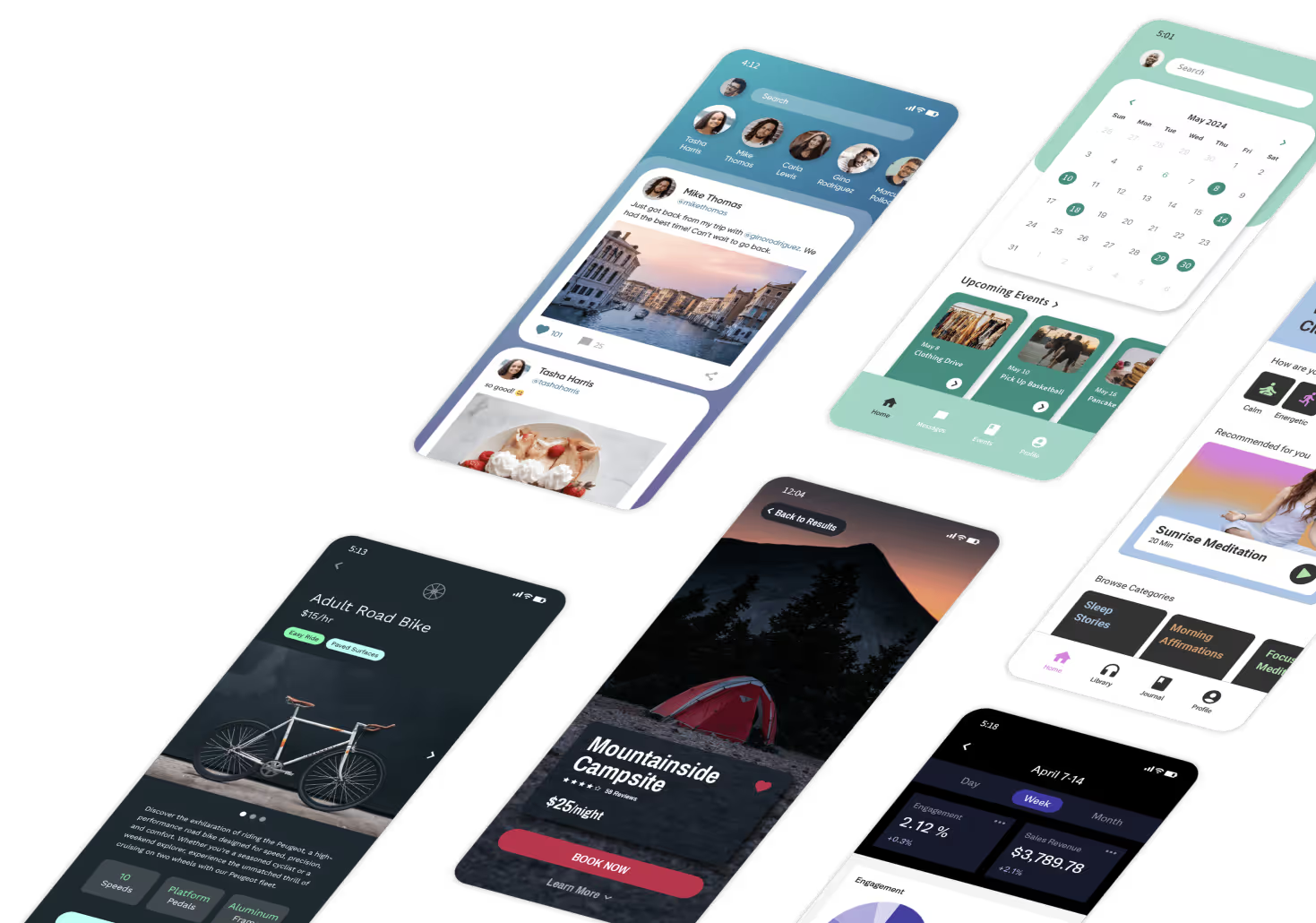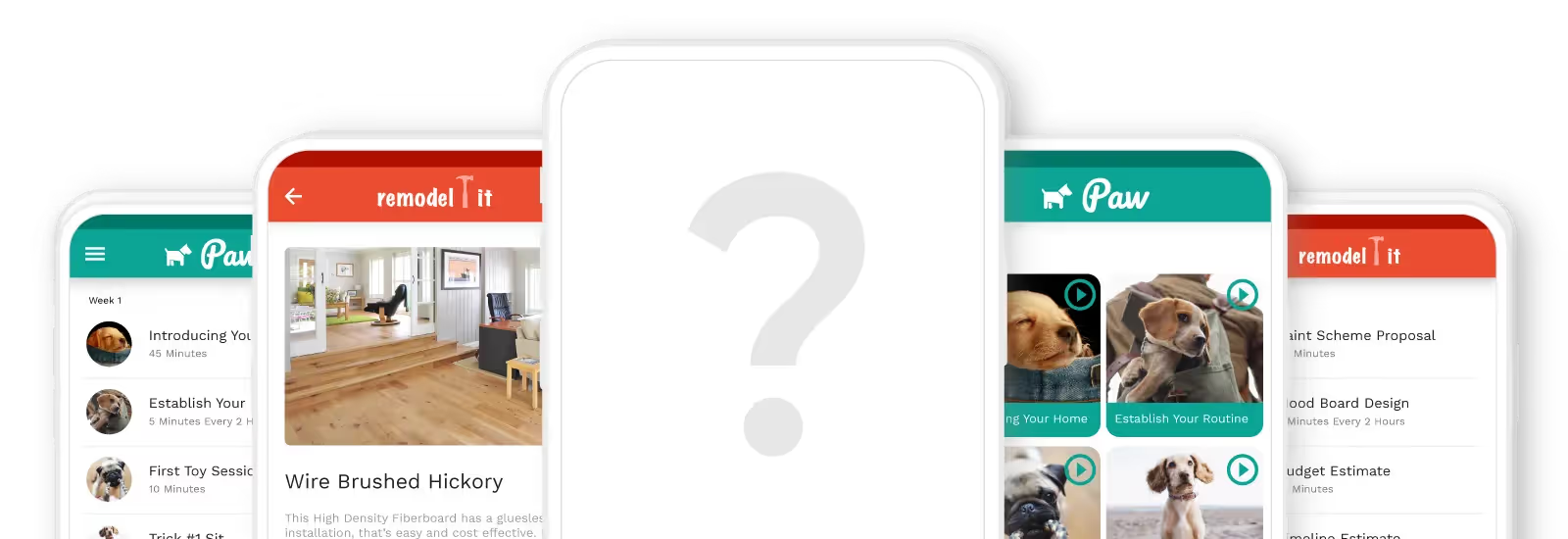
Appsmith is an open-source app-building platform that lets businesses create their own internal apps, tools, and workflows, but it requires technical expertise.
Read on to learn more:
- How Appsmith works
- Appsmith’s essential features
- Pros and cons of Appsmith
- How to know if Appsmith is right for you
- Adalo, a top Appsmith alternative
Now, let’s examine how the Appsmith building interface works and some of its primary features.
How Appsmith Works

Appsmith is a low-code web app builder. It only allows you to create internal business apps, like CRM boards, workflow automations, and more.
Because it’s a low-code tool, you’ll need technical skills to use Appsmith. Knowing SQL language, how database schema works, how to work with APIs, coding structure, and more will go a long way.
Connecting a Database
After creating a free Appsmith account, you’ll be ushered to a page that lets you connect your pre-existing data source to the building interface. Unfortunately, you won’t be able to build your own database in Appsmith — you’ll need your own database to start building your app.
If you already have a database, you’ll be delighted to know that Appsmith integrates with a long list of database sources, including MongoDB, MySQL, Oracle, and many others. Once you connect your database to Appsmith, you’ll land on the building interface.
Appsmith’s Building Interface
You’ll find Appsmith’s building canvas at the center of your screen. On the far left-hand side, you’ll see two buttons: The top Editor Button and the bottom Data Button.
Click the Editor button to add user interface (UI) elements and widgets like tables, labels, buttons, and more. Then, drag and drop these elements into your building canvas. To view your complete database schema, push the Data button. You can edit your schema by selecting the “edit” button at the top of the screen.
Clicking the Editor Button lets you connect with APIs or patch in your own JavaScript commands. To connect an API, click the Queries button at the top of the screen. Similarly, to input your own code, press the “JS” button next to Queries and follow the instructions to start coding.
Appsmith’s Key Features
Tech teams tasked with creating internal apps for their organization enjoy Appsmith because it provides the following convenient features:
- Open-source framework: Appsmith allows you to download the source code for each app you create so you can do what you wish with them. You can continue developing your app using programming, hire an agency to develop it for you or share it with other developers using Appsmith’s GitHub integration.
- Loads of integrations: As we mentioned, Appsmith is packed with database integrations, covering the data needs of many large-scale organizations. However, the platform’s integrations don’t stop there. You’ll also get several API integrations (including an uber-powerful REST API), SaaS integrations with tools like Twilio and HubSpot, as well as integrations with AI platforms like OpenAI (the makers of ChatGPT), Claude, and more.
- On-prem hosting: If you want to host your Appsmith apps on your very own servers, then you’re in luck! Unlike most other no-code and low-code platforms, you can run your app from the comfort of your office, allowing for tighter security, greater data control, easier scaling, and a super-stoked IT team.
Appsmith’s Pros and Cons
Everything under the sun comes with tradeoffs, and Appsmith is no exception. Most folks report the following benefits and drawbacks after using the app builder.
Pros
- Developer Friendly: If you have tech experience and know your way around a database, you’ll most likely enjoy the freedom you’ll get when working with Appsmith.
For instance, you can program your features using JavaScript, mark up your database schema precisely, keep your source code for further development, and run your app on-prem. Many other low-code and no-code tools don’t allow such a robust set of options.
- Build unlimited apps with unlimited users: You aren’t limited to the number of apps you can build. If your business is growing and you must constantly create apps to streamline your workflows, manage your client base, or execute any other tasks, Appsmith’s got your back.
Plus, each plan allows for unlimited users — even with the free version. When comparing other low-code competitors, like Appsmith vs. Retool, this feature makes Appsmith particularly attractive, as Retool only allows for 5 users on the free version. You can test your app out with various folks and devices before launching a paid plan.
- Unleash the power of AI: We already mentioned that Appsmith integrates with popular AI tools like Claude and Open AI, which enable you to build chatbots into your app and perform other functions like image recognition, data analysis, and more.
Yet, Appsmith also comes preloaded with its own AI feature — Appsmith AI. This useful tool can assist you while you’re building your app by suggesting widgets, generating code, and guiding you through the building interface.
Cons
- Technical skills required: While Appsmith provides robust versatility and considerable customization, it all comes at a cost — you’ll need some technical expertise to use and understand the platform. If you’re unfamiliar with databases, backends, or coding, you’ll probably be frustrated with Appsmith.
- Unconventional pricing plans: Most app builders charge per app created, the number of app editors, and the number of logged-in users. Appsmith’s first pricing tier, aimed at medium — to larger-sized businesses, allows for only 100 hours of monthly use for $40 per month.
A premium of $0.40 is charged every hour after that. So, organizations with dozens of people using apps could face a hefty monthly bill.
- For internal business apps only: If you wish to create apps for social media, booking, real estate, and others used by non-logged-in, anonymous clients, you’ll have to look elsewhere. Appsmith only supports creating apps to improve processes or interact with and organize data.
Who Is Appsmith Suited for?
Appsmith is used primarily to build internal business tools, software, and apps. Its scalability and permission to create an unlimited number of apps, combined with the option for on-prem hosting, make it a go-to for medium-sized and large-scale enterprises with tech-savvy development teams.
Is Appsmith Right for You?
On the fence about Appsmith? Consider the following when evaluating if this app builder is suitable for your needs:
- The size of your organization: Appsmith is mainly targeted at medium-sized businesses and above. If you consider yourself a small business or even a small to medium business, you might find that the features are outside your scope.
- Your need for unlimited internal apps: Before you get started with Appsmith, determine whether or not you need to build an unlimited number of internal business apps. If you’re like some organizations, you might only need 2 or 3 apps to manage your CRM, marketing funnels, and accounting processes, meaning you can find a simpler app builder for less cost.
- Technical expertise: We’ve said this repeatedly, but to use Appsmith, you’ll need to bring a specific amount of database, backend, and coding knowledge. Ensure you have a few techies on your team before getting the platform.
Luckily, you won’t need to contact sales and set up a demo, nor will you be pressed for time by a limited free trial. Before considering Appsmith pricing, you can take advantage of its free trial that grants access to several UI tools, Google and GitHub single sign-on (SSO), on-prem hosting, and several other perks.
'{{rich-cta}}'
Adalo: A Flexible and Easy Appsmith Alternative

Looking for a more straightforward app builder that lets you create nearly any type of app, not just internal business tools? Try Adalo.
Adalo is a no-code native mobile app builder with the flexibility to make nearly any app you can think of — like for project management, KPI tracking, booking, fitness, and much more. Plus, you won’t need any tech background to use Adalo — it’s simple enough to get started with right after signing up.
Power is another feature that Adalo users enjoy: You’ll get immense design freedom, allowing you to customize your app’s colors, structure, and functionality to fit your exact needs. You can also publish your app on the web, the Apple App Store, and Google Play Store, so nearly anyone can get your app.














